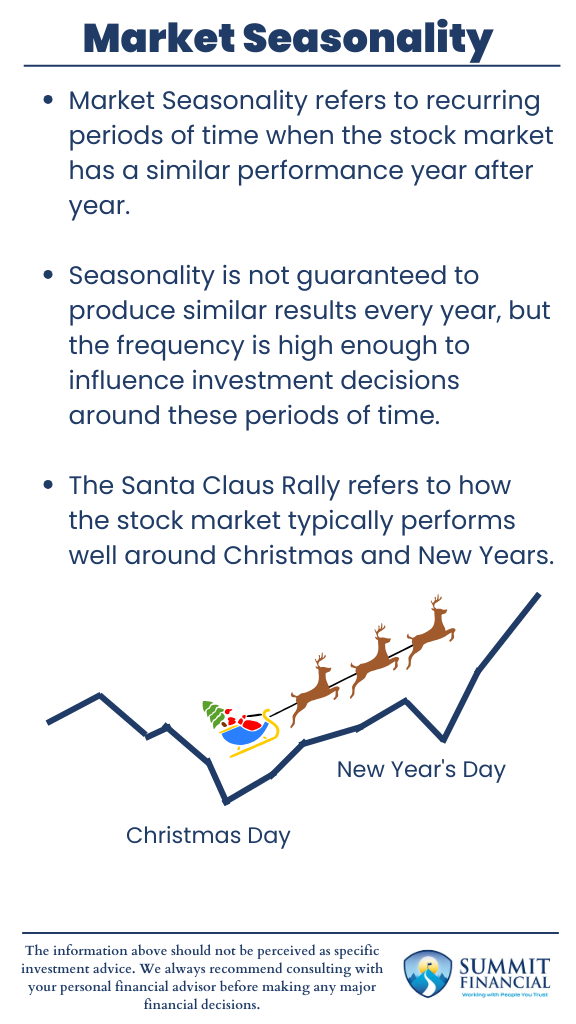We have discussed the Santa Claus Rally in a previous blog post, and we suggest reviewing this previous content before we dig deeper into Market Seasonality below.
The Santa Claus Rally is perhaps one of the most common examples of Market Seasonality, and considering we are approaching this time of year, we found it fitting for us to revisit this topic again.
Seasonal Trends in the Broader Economy
Seasonal trends can be identified across various economic industries, and these trends correlate to when businesses may be growing or slowing on a recurring basis, year after year (source).
For example:
-
Electricity companies tend to see a surge in consumer usage during the summer when customers are relying more heavily on their air conditioning, which is also seen as a drop in usage for the gas supplier.
-
Amazon and other large retailers see a large influx of consumer spending around the holidays that spike above the normal rate throughout other months of the year.
In a previous post, we explored the “Santa Claus Rally,” a prominent example of seasonality within the financial markets. We encourage revisiting that post for a foundational understanding before delving deeper into the broader implications of market seasonality below.
What Is Market Seasonality?
Market Seasonality refers to recurring periods of time when the stock market has similar performance year after year.
There can be many reasons behind these trends in the stock market. Some of which include:
-
Fluctuations in trading volume around holidays
-
Focused trading around economic/company data releases
-
Timelines related to tax filing/contribution deadlines
Market participants and analysts typically include these types of seasonal factors when making investment decisions. Seasonality is not guaranteed to produce similar results every year, but the frequency is high enough to influence investment decisions around these periods of time.
Explaining the Santa Claus Rally
The Santa Claus Rally refers to how the stock market typically performs well around Christmas and New Year.
-
A lot of analysts and traders take time off for the holidays, and this results in less market volume.
-
Lower volume can tend to lead to better performance since there will be a reduction in the shares that are being sold.
-
This time of year also correlates with end-of-year bonuses for employees as well as end-of-the-year contributions into various retirement plans for tax purposes.
This combination, along with additional factors, can potentially rationalize why this time of year tends to be positive from an investment standpoint.

How We Use Seasonality in Our Portfolio Management
We do utilize Market Seasonality when reviewing the investment decisions within our in-house actively managed portfolios.
-
We have indicators that are built around these seasonally strong/weak periods of the year.
-
We are alerted to when the indicators suggest getting in and out of the market.
Of course, it is not the only indicator we use, and it is considered an overlay on some of our stronger, longer-term indicators. We believe a balanced analytical approach to investing is potentially the best solution for our clients, so we do not want to overlook something as useful as Market Seasonality.
Market Seasonality – Highlights
- Market Seasonality refers to recurring periods when the stock market has a similar performance year after year.
- Seasonality is not guaranteed to produce similar results yearly, but the frequency is high enough to influence investment decisions around these periods.
- The Santa Claus Rally refers to how the stock market typically performs well around Christmas and New Years.
Speak With a Trusted Advisor
If you have any questions about your investment portfolio, retirement planning, tax strategies, our 401(k) recommendation service, or other general questions, please give our office a call at (586) 226-2100. Please feel free to forward this commentary to a friend, family member, or co-worker. If you have had any changes to your income, job, family, health insurance, risk tolerance, or your overall financial situation, please give us a call so we can discuss it.
We hope you learned something today. If you have any feedback or suggestions, we would love to hear them.
Best Regards,
Zachary A. Bachner, CFP®
with contributions from Robert Wink, Kenneth Wink, and James Wink.
If you found this article helpful, consider reading:
- How Do Bull Markets and Bear Markets Differ
- Navigating College Funding
- Financial Planning Mistakes to Avoid
- Tax Filing Explained
Sources:


